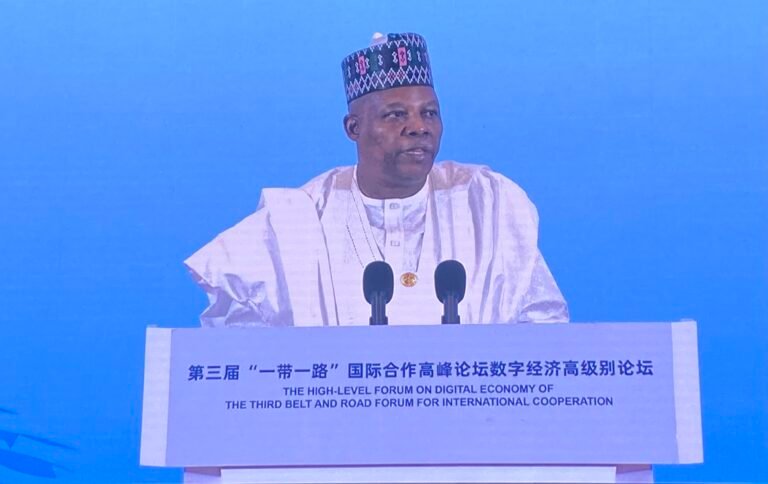By Aluta News
Oct. 18, 2023
Vice-President Kashim Shettima, on Wednesday said Nigeria would continue to support China towards ensuring sustainable digital economy.
Shetima made this known while addressing a two-day third Belt and Road Forum for International Cooperation summit, holding on Oct. 18 and Oct. 19, in Beijing.
The vice-president commended China on the occasion of the country’s 10th anniversary of the Belt and Road Initiative (BRI), saying the initiative had impacted positively on infrastructural development, not only in China but globally.
Shetima said, “The BRI has achieved ground-breaking interventions and made monumental achievements especially in terms of infrastructure.
“The Belt and Road achievements reflect China’s commitment to leverage on cooperation and the UN’s efforts towards achieving economic development.
“Specifically, for the prosperity of the people in every economy, BRI has been a major contributor to the implementation of the UN 2030 agenda for Sustainable Development Goal.”
Speaking on the digital economy, Shettima said that the world had been experiencing new approaches and global dimensions to governance through digital technology.
According to him, the digital economy has played major role towards acceleration of global economic growth and recovery as replacement mechanism through process of trans border trade.
“As the world emerges from the economic downturn, caused by the COVID-19 pandemic, there is crucial need for developing economies to employ digital transformation practices.
“Especially, in the aspects of manufacturing, agriculture, retail and human capacity building, as well as medical and health care, in order to achieve any meaningful and sustainable development.
“I therefore commend China for introducing digital seed growth as vehicle for achieving international economic cooperation beyond geographical spheres.
“Nigeria is no exception in global shift in digital economy being the largest economy in Africa, and as the most populous country in the continent, we intend to remain top of the ladder through formulation and implementation of digital oriented policies.”
He said although Nigeria started by establishing digital strategy policy in November 2019, government would do all within its ambit to transform and reposition the nation’s digital economy to become a leading one.
He identified strategic pillars of the policy to include digital literacy, skills development, solid infrastructure, sub-infrastructure, service infrastructure, digital society, emerging technologies and indigenous economy.
“These are part of the Federal Government’s initiative to accelerate the diversification of Nigerian economy and enhancing productivity in critical sectors through technological innovation
“Through this strategic blueprint, the federal government aims to accelerate the growth of Nigeria as global technical tele-hub and exporter of talents.
“One of the goals of this tele-hub is to train 3 million early to meet career technical talents from 2023 to 2027; Nigeria stands at unique opportunity to tap into the hub.
“Our proximity to Europe and proficiency in English are added advantages towards repositioning our economy,” the vice-president added.
He said Nigeria, being a trading partner to most BRI countries, would continue to collaborate with the group to bring positive shift to advance growth of global economy, in terms cooperation with global South.
The vice-president expressed appreciation to China for the partnership extended to Nigeria and commended Chinese President Xi Jinping and the people of China for the existing cordial relations between Nigeria and China.
The vice-president was accompanied to the event by Amb. Baba Ahmed Jidda, Nigeria’s Ambassador to China, the Minister of Foreign Affairs, Amb. Yusuf Tuggar, and Alhaji Mohammed Idris, Minister of Information and Orientation.
NAN


